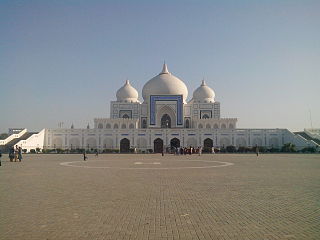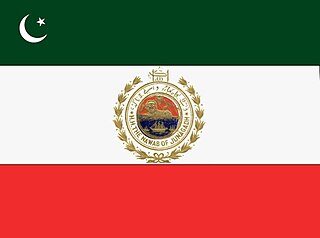
Junagadh is the city and headquarters of Junagadh district in the Indian state of Gujarat. Located at the foot of the Girnar hills, 355 kilometres (221 mi) southwest of Ahmedabad and Gandhinagar, it is the seventh largest city in the state.
Shah Nawaz Bhutto, was a politician and a member of Bhutto family hailing from Larkana in the Sind region of the Bombay Presidency of British India, which is now Sindh, Pakistan.

Before the Indian independence in 1947, India was divided into two sets of territories, one under direct British rule, and the other consisting of princely states under the suzerainty of the British Crown, with control over their internal affairs remaining in the hands of their hereditary rulers. The latter included 562 princely states which had different types of revenue-sharing arrangements with the British, often depending on their size, population and local conditions. In addition, there were several colonial enclaves controlled by France and Portugal. After independence, the political integration of these territories into an Indian Union was a declared objective of the Indian National Congress, and the Government of India pursued this over the next decade.
Babi enters in various Indian titles. Babi or Babai is a Pashtun Tribe. Babi or Babai is son of Ghorghasht or Gharghashti. It has its origin as quoted 'Bahadur Khanji Babi, son of Usman Khan, who migrated to India and entered the Mughal service and received the hereditary title of Babi in 1554 from Emperor Humayun, for services against the Rana of Chittor'.

India–Pakistan relations are the bilateral ties between the Republic of India and the Islamic Republic of Pakistan. The two countries have a complex and largely hostile relationship that is rooted in a multitude of historical and political events, most notably the partition of British India in August 1947. The India–Pakistan border is one of the most militarised international boundaries in the world. Northern India and most of modern-day Pakistan overlap with each other in terms of their common Indo-Aryan demographic, natively speaking a variety of Indo-Aryan languages.
Events from the year 1947 in Pakistan.

The Bhutto family is a prominent political family based in the Pakistani province of Sindh. The Bhuttos have played a prominent role in Pakistani politics and government. The family has held the leadership of the Pakistan People's Party (PPP), since its inception in 1967. The Bhuttos are based in Sindh province. The Bhuttos have been settled in the area for over three centuries.

In February 1948, the princely state of Junagadh, located in what is now the Indian state of Gujarat, was annexed to the Union of India after a dispute with the Dominion of Pakistan, regarding its accession, and a plebiscite.
The Babai is a Pashtun tribe also known as Babi. Their traditional primary homeland is in Qalat, Zabul, located in Southern Afghanistan and Kandahar, largely settled in Afghanistan, Pakistan and India.

Sir Muhammad Mahabat Khanji III Rasul Khanji,, was the last ruling Nawab of Junagadh of the princely state of Junagadh in India from 1911 to 1948. He was the father of Muhammad Dilawar Khanji – former Governor of Sindh and his claimed successor. Famed for his extravagant lifestyle and his love of dogs, his decision to accede Junagadh to the Dominion of Pakistan following India's Independence led to the Indian Army taking military action. He is credited with pioneering a conservation effort in what is now the Gir National Park that saved India's last few lions from almost certain extinction.

Gujarati Pashtuns/Pathans are a group of Pashtuns who are settled in the region of Gujarat in western India. They now form a distinct community of Gujarati and Urdu/Hindi speaking Muslims. They are distributed throughout the state, but live mainly in Ahmedabad, Rajkot, Junagadh, Surat, Bhavnagar, Panchamahal, Koth, Kotha, Borsad, Kheda, Banaskantha, Bharuch, Gandhinagar, Sabarkantha, Vadodara and Mehsana. They mainly speak Urdu/Hindi with many Pashto loanwords, but most of them have been Indianized so some may have Gujarati as their first language as well, few elders in the community still speak Pashto. Common tribes include Babi or Babai, Niazi, Khan, Bangash, Durrani, and Yousafzai.

The Babi dynasty was a Afghan dynasty that formed the ruling royal houses of British India's princely states. The Babai community, originally of Afghan descent, largely resides in India and some parts of Pakistan. The community traces its royal origins to the dynasty founded by Sherkhanji Babi in 1654, who was himself a ruler from the dynasty's founding until 1690. The last Nawab of the British Indian princely state of Junagadh, Sir Muhammad Khanji, signed an Instrument of Accession and acceded his princely state of Junagadh, as well as its vassal state of Bantva Manavadar, to the Dominion of Pakistan after the Partition of British India in 1947. However, the Dominion of India did not recognize the accession and annexed the princely state shortly afterwards.
Babariawad was a small principality under suzerainty of the Princely state of Junagadh. During British India, was the easternmost district of Princely State of Junagadh, in south central Kathiawar. It consisted then of some 51 villages and city of Rajula. it was named after Babaria Kolis who were famous for ruled known as Dhang.

Junagarh or Junagadh was a princely state in Gujarat ruled by the Muslim Babi dynasty in India, which acceded to the Dominion of Pakistan after the Partition of British India. Subsequently, the Union of India annexed Junagadh in 1948, legitimized, controversially, through a plebiscite orchestrated the same year.

The princely states of Pakistan were princely states of the British Indian Empire which acceded to the new Dominion of Pakistan between 1947 and 1948, following the partition of British India and its independence.

The State of Balasinor was a princely state in Balasinor during the era of British India and founded by Sardar Muhammed khan Babi and Murtuza Bhatia The last ruler of Balasinor signed the accession to join the Indian Union on 10 June 1948. Its rulers belonged to the family of Babi or Babai tribe. The state was founded by the Junagadh State Babi dynasty.
Muhammad Dilawar Khanji was a Pakistani politician who was 11th Governor of Sindh from 1 March 1976 to 5 July 1977. He also claimed to be the titular Nawab of Junagarh from 1959–89.

Ghulam Moinuddin Khanji was the ruler of Manavadar State, one of the princely states associated with British India. Although Khanji chose to accede to Pakistan after the partition of India, the state was soon annexed by India and a subsequent referendum resulted in a massive Indian victory.
Muhammad Jahangir Khanji was the Nawab of Junagarh who dedicated himself to the cause of Junagarh state's independence, persistently advocating for its liberation from Indian occupation. His grandfather, Nawab Mahabat Khanji, had previously signed an instrument of accession to Pakistan on 15 September 1947, during his reign as the Ruler of Junagarh State.












